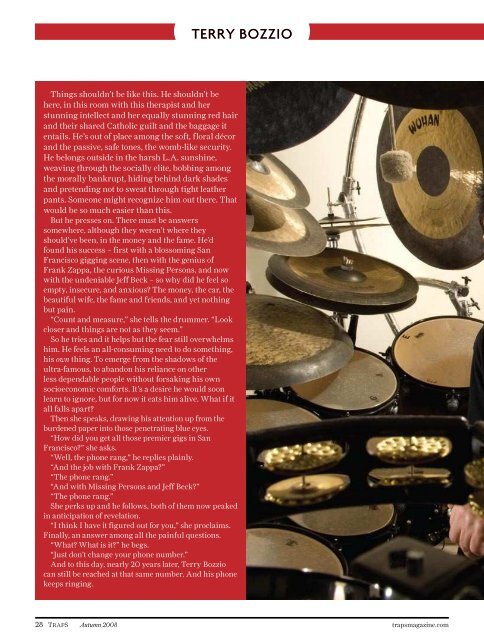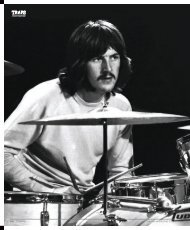Create successful ePaper yourself
Turn your PDF publications into a flip-book with our unique Google optimized e-Paper software.
Things shouldn’t be like this. He shouldn’t be<br />
here, in this room with this therapist and her<br />
stunning intellect and her equally stunning red hair<br />
and their shared Catholic guilt and the baggage it<br />
entails. He’s out of place among the soft, floral décor<br />
and the passive, safe tones, the womb-like security.<br />
He belongs outside in the harsh L.A. sunshine,<br />
weaving through the socially elite, bobbing among<br />
the morally bankrupt, hiding behind dark shades<br />
and pretending not to sweat through tight leather<br />
pants. Someone might recognize him out there. That<br />
would be so much easier than this.<br />
But he presses on. There must be answers<br />
somewhere, although they weren’t where they<br />
should’ve been, in the money and the fame. He’d<br />
found his success – first with a blossoming San<br />
Francisco gigging scene, then with the genius of<br />
Frank Zappa, the curious Missing Persons, and now<br />
with the undeniable Jeff Beck – so why did he feel so<br />
empty, insecure, and anxious? The money, the car, the<br />
beautiful wife, the fame and friends, and yet nothing<br />
but pain.<br />
“Count and measure,” she tells the drummer. “Look<br />
closer and things are not as they seem.”<br />
So he tries and it helps but the fear still overwhelms<br />
him. He feels an all-consuming need to do something,<br />
his own thing. To emerge from the shadows of the<br />
ultra-famous, to abandon his reliance on other<br />
less dependable people without forsaking his own<br />
socioeconomic comforts. It’s a desire he would soon<br />
learn to ignore, but for now it eats him alive. What if it<br />
all falls apart?<br />
Then she speaks, drawing his attention up from the<br />
burdened paper into those penetrating blue eyes.<br />
“How did you get all those premier gigs in San<br />
Francisco?” she asks.<br />
“Well, the phone rang,” he replies plainly.<br />
“And the job with Frank Zappa?”<br />
“The phone rang.”<br />
“And with Missing Persons and Jeff Beck?”<br />
“The phone rang.”<br />
She perks up and he follows, both of them now peaked<br />
in anticipation of revelation.<br />
“I think I have it figured out for you,” she proclaims.<br />
Finally, an answer among all the painful questions.<br />
“What? What is it?” he begs.<br />
“Just don’t change your phone number.”<br />
And to this day, nearly 20 years later, Terry <strong>Bozzio</strong><br />
can still be reached at that same number. And his phone<br />
keeps ringing.<br />
terry bozzio<br />
Chapter 1 a fully DevelopeD CharaCter<br />
Today he is quite possibly our world’s most complex,<br />
unique, and inventive drummer, but in 1950 Terry <strong>Bozzio</strong><br />
began life just like the rest of us. His San Francisco<br />
upbringing was fairly simple and music was a part of his<br />
life from the beginning. Mom once sang in the high school band and<br />
still loves to flex her voice, while dad, a salesman by trade, was a<br />
child prodigy accordion player.<br />
“There was always music around<br />
the house,” recalls <strong>Bozzio</strong>, looking<br />
younger than his 58 years. Dressed in<br />
his omnipresent black jeans and black,<br />
long-sleeved T-shirt, he smells faintly<br />
of organic soap. His hands seem ten<br />
years older than his smooth, pasty face,<br />
while his words are crisp and articulate,<br />
thoughtful and intelligent. “My<br />
dad loved to play accordion, but he<br />
had a messed-up teacher who would<br />
hit him and didn’t understand that he<br />
was memorizing instead of reading and<br />
things like that. So it was kind of twisted<br />
and made him rebel against music.<br />
“When my relatives would gather for<br />
a Sunday meal they would prod him to<br />
play the accordion and he would always<br />
kind of refuse. Eventually he would<br />
take it out and begrudgingly play a few<br />
notes, and the whole room would get<br />
quiet. People would cry. This power of<br />
how he could entrance an audience and<br />
enrapture them and move them emotionally<br />
was part of my upbringing, and<br />
I think if I have any abilities towards<br />
that it comes from my dad.”<br />
While the ability to move his audience<br />
would come in time, first young<br />
<strong>Bozzio</strong> needed to discover the drums.<br />
Black-and-white 1950s TV provided his<br />
first window into the world of percussion,<br />
and after watching child drummers<br />
like Ricky Ricardo and Cubby O’Brien,<br />
<strong>Bozzio</strong> began playing on household items<br />
– nesting tables and the like – to simulate<br />
the Latin sounds of Tito Puente.<br />
“Then when I was ten I received a set of<br />
bongos and proceeded to take them apart<br />
and create my own makeshift drum set<br />
with some loose-leaf paper and a rubber<br />
band as the snare on the small one and<br />
the block underneath the other one as the<br />
tom. Then I used a piece of string to tie<br />
up a crumpled high-voltage sign and that<br />
was my hi-hat. And I played using broken<br />
arrows from my archery set.”<br />
The young <strong>Bozzio</strong> didn’t know that he<br />
was constructing the first of what would<br />
become many legendary drum kits that<br />
are more machine, more art, more sculpture<br />
than mere instrument. He’d play<br />
these makeshift contraptions to surf<br />
drum music like The Ventures and The<br />
Beach Boys. Then The Beatles played<br />
on The Ed Sullivan Show and the musical<br />
world changed forever.<br />
“That was it. I told my dad I had to have<br />
drum lessons. Ringo had a small kit and<br />
he sat high so you could see him play. So<br />
I sat in front of a mirror we had in the living<br />
room and I emulated his movements.<br />
By the time I took my first drum lessons<br />
I was ready to go because I had practiced<br />
it in my mind and mimed it so much. My<br />
teachers told me I was four or five weeks<br />
ahead as far as coordination and that stuff.<br />
I started with a pad and some sticks and<br />
books and went along with my two teachers<br />
for about six months.<br />
“I learned all the basic rudiments, and<br />
Syncopation by Ted Reed, and especially<br />
Stick Control by George Stone. Then I<br />
played in garage bands throughout high<br />
school, just kind of playing by ear and<br />
having fun, that whole ’60s revolution<br />
was happening. I went from The Beatles<br />
into The Stones and then the San Francisco<br />
thing. I remember being able to go<br />
down the street – Jefferson Airplane,<br />
Big Brother And The Holding Company,<br />
Country Joe And The Fish, were like<br />
local bands – and hearing these bands<br />
for like, $2.50 just blocks away. They<br />
would play at the Fairfax Pavilion and I<br />
could hear it from my house.”<br />
Then it was off to the College Of<br />
Marin as a music major for some formal<br />
instruction and a rude awakening.<br />
The music scene quickly switched<br />
from heavy bands like Hendrix, Cream,<br />
and Led Zeppelin, into more singer/<br />
songwriters like Elton John and David<br />
Bowie. Popular music became infinitely<br />
28 TRAPS Autumn 2008 trapsmagazine.com trapsmagazine.com Autumn 2008 TRAPS 29



